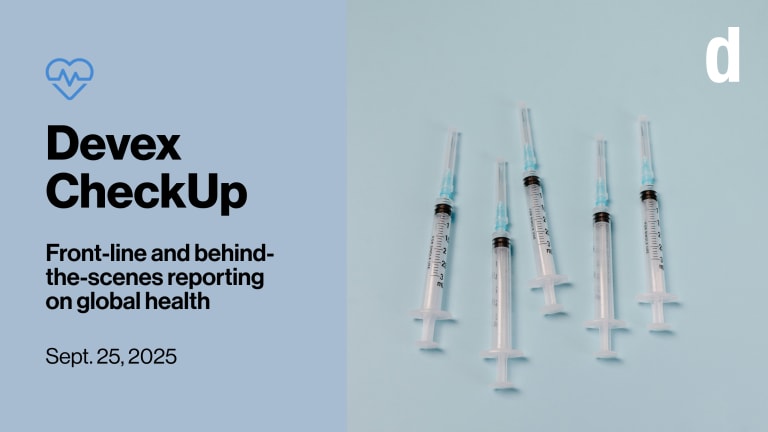
Indian pharmaceutical company Hetero Labs Ltd will make a generic version of HIV drug darunavir boosted with ritonavir, known as DRV/r, at the price of $210 per patient per year for 90 countries, the majority of which are low or middle income.
The pricing agreement, announced by Unitaid and Clinton Health Access Initiative, provides for one more HIV treatment option — taken once a day — for people living with HIV who develop treatment failure with first-line HIV drugs in LMICs.
Governments and international agencies such as the U.S. President’s Emergency Plan for AIDS Relief and the Global Fund to Fight AIDS, Tuberculosis and Malaria will be able to purchase the drug at this price point.
Sign up for Devex CheckUp
The must-read weekly newsletter for exclusive global health news and insider insights.
The 90 countries include all low-income countries under the World Bank’s income classification, as well as the majority of lower-middle-income countries and a few upper-middle-income countries. Seychelles, classified as a high-income country by the World Bank, is also included, according to a list seen by Devex.
The drug DRV/r has been in use in several high-income countries such as the United States for more than a decade, but has been inaccessible in most low- and middle-income countries, where the burden of HIV is greatest, because of its high price, and supply and intellectual-property-related hurdles, according to Raef Makar, interim HIV and hepatitis-focused pharmacist for Médecins Sans Frontières’ Access Campaign.
The cost of a one-year treatment course of DRV/r is more than 10 times the cost of a first-line HIV treatment regimen of dolutegravir, lamivudine, and tenofovir, which costs just $63 a year, he said.
“Reducing the price three times lesser than the original price is going to ensure broader access to ARV-experienced patients who need DRV due to its high genetic barrier (very low rates of resistance),” Makar added.
However, he said that when it comes to drug interactions, darunavir cannot be used with rifampicin, limiting its use for patients with HIV/tuberculosis co-infection.
In 2016, Unitaid worked with CHAI to help bring generic formulations of optimal antiretroviral treatments such as darunavir in LMICs.
“Unitaid’s investment in CHAI sought to overcome the catch-22 in which generic suppliers looked to market signals — most notably, WHO [World Health Organization] treatment guidelines — to determine whether an investment in a new product was likely to yield a significant return, while the WHO generally will not include a product in its ARV [antiretroviral] treatment guidelines until a generic, affordable version is available,” Unitaid spokesperson Hervé Verhoosel wrote in an emailed response.
DRV/r is currently listed as an alternative second-line HIV therapy, under WHO guidelines. But Unitaid hopes it will become a preferred second-line therapy with an “affordable and accessible generic DRV/r product” now available. Hetero Labs Ltd. now has WHO prequalification for its DRV/r product.
Janssen announced in 2012 it won’t enforce patents for darunavir when used in sub-Saharan Africa and least developed countries. However, access to the drug has been hampered by other factors such as slow regulatory approval and a long product development timeline. It took a long time to develop a stable, generic formulation of the drug and complete successful bioequivalence studies, according to Verhoosel.
CHAI worked with Janssen and generic drug manufacturers to encourage data sharing to speed up generic drug development and regulatory filing. Unitaid meanwhile provided a financial incentive to Hetero Labs Ltd. to secure the agreed pricing for the drug. Without such financial incentive, Verhoosel said it would be “very difficult” for any generics manufacturer to launch the product at such a competitive price. The financial incentive helps cover the high cost of manufacturing the product at launch until a few years when production costs are lower.
The payment of the financial incentive is linked to several conditions, including for Hetero Labs Ltd. to maintain lead times, register broadly, and offer the drug at the agreed price or lower to eligible buyers even after the incentive period expires. The terms and timeline of the incentive are in the contract, but “the specifics are confidential,” according to Verhoosel.
Unitaid expects DRV/r to be introduced in countries by early 2022. But the COVID-19 pandemic could affect this timeline.
But even as the pricing for DRV/r has been negotiated and the product has received regulatory approval, Verhoosel anticipates one more barrier, “Many high-burden HIV countries are currently struggling with a third wave of COVID, which could make it difficult to prioritize [the] introduction of DRV/r,” he said.







